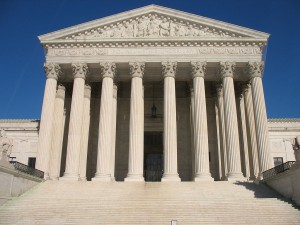
There’s been a lot of discussion in recent weeks about the Supreme Court’s ruling on contraception coverage in the Hobby Lobby case. Those who hated the ruling say it’s about to lead to the downfall of women’s rights, while supporters say it simply reaffirms religious freedom.
Whether you support or decry the decision, one of the outcomes has been the perpetual discussion of how the decision could lead to all sorts of other unconscionable things. This is generally known as the slippery slope discussion. And it is what dystopian fiction writers love. Why? Because, we love to slip down that slope into what could be a terrifying proposition.
I thought I’d bring up the ruling (not to engage in discussion and particularly not to engage in debate on the subject), but because the slippery slope discussion mirrors my novel, Life First. The book follows the plight of Kelsey Reed, who has been ordered to give up her kidney to a stranger, whether she wants to or not (she does not; otherwise this would be a pretty dull book).
While Kelsey’s journey is the focus of the book, when we get into deep background on this society, we learn that the reason the society Kelsey lives in is the way it is all leads back to a Supreme Court decision. Booyah. Feeling Deja Vu. (Or maybe not; that’s probably not a correct use of deja vu.) Feeling Twilight zonish, perhaps? OK, still too much. Feeling relevant. That’s good, right?
The court decision, also one involving body rights, determined that all citizens were obliged to help others live, even if it meant sacrificing parts of their body to do it. Now, the court didn’t make this decision under the circumstances we live in today. People are reluctant to switch lanes to let others onto the highway, let alone give up vital organs. However the court referenced in the book was the first wave of judges following a massive pandemic that wiped out much of society. They were a court consumed with the idea that civilization had to be rebuilt, that humanity needed to be preserved and life should come first, above all else. But, it’s this court decision, even though discussed very limited in the book, that ends up affecting society in a way that it propels this story.
While some people poo poo the impact of court decisions, the truth is, certain decisions can have major impacts on society. Look at the Plessy vs. Ferguson decision. Don’t remember it? Well, it involved Homer Plessy, who was one-eighth black (and therefore too black to sit with white people) purchasing a first class train ticket and being denied admittance in the “whites only” first class rail car. In the 1896 case, the Supreme Court codified the doctrine of Separate but Equal. While many have forgotten the name Plessy, most remember Brown vs. Board of Education (1954). That’s the Supreme Court decision, nearly six decades after the first separate but unequal treatment began, that overturned the policy.
Now, not every court decision is as impactful to society as Plessy or Brown. But, when they are, the people negatively impacted by them, spend years suffering the consequences. While it’s fun to write the slippery slope in fiction, it’s no fun to live it.
That’s about all I’ve got to say on court cases. Just a friendly reminder that the Goodreads Giveaway of Third Life: Taken is live now. So, have at it if you’re interested.
Interesting premise, RJ. I’m getting close to reading Life First (huge TBR pile + slow reader :-)) Can’t. Wait.
Thanks, DV. I feel you on the TBR list; it keeps growing and growing. Too many good books, too little time.